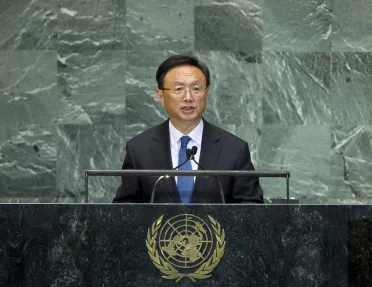Statement
Statement summary
YANG JIECHI, Minister for Foreign Affairs of China, said that, in its pursuit of peace and development amid a global financial crisis and regional conflicts, the international community should “act like passengers who stick together in a boat when crossing a torrential river, and seek win-win progress through cooperation”. On regional conflicts, he expressed his country’s respect and support for efforts by countries in West Asia and North Africa to handle their internal affairs independently, as well as the calls of their citizens for change and development. Expressing deep concern about the stalled Israeli-Palestinian peace process and the economic and humanitarian difficulties facing the Palestinian people, he reiterated China’s support for the creation of an independent Palestinian State, enjoying full sovereignty and with East Jerusalem as its capital. China also supported Palestine’s membership in the United Nations and other international organizations.
Troubled by the persistent tension and worsening humanitarian situation in Syria, he called on all relevant parties immediately to cease fighting and implement the relevant Security Council resolutions, the six-point plan, and the communiqué of the meeting of foreign ministers of the Action Group for Syria, in addition to launching an inclusive political dialogue and a Syrian-led political transition as soon as possible. As for the Iranian nuclear issue, he said it had reached a critical new stage, and the parties concerned should remain committed to a diplomatic solution and begin a new round of dialogue as soon as possible. China had always supported efforts to uphold the international nuclear non-proliferation regime, and would continue to play a constructive role in seeking a peaceful solution.
China remained committed to building peace and security not only in the Asia-Pacific region, but across the globe, he said, adding that his country was focused on sharing development opportunities with other countries, and would stay on the track of peaceful development. It had contributed a total of about 21,000 personnel to United Nations peacekeeping missions and had taken an active part in international cooperation on counter-terrorism, anti-piracy and non-proliferation. It had also actively expanded its exchanges with neighbouring countries, contributing to more than 50 per cent of Asia’s growth for many consecutive years. By the end of 2011, the Government had built more than 2,200 projects in those countries, and had cancelled the debts owed to it by 50 heavily indebted poor countries and least developed countries. It had trained more than 60,000 personnel in various sectors for 173 developing countries and 13 regional and international organizations — significant contributions to the economic and social progress of other developing countries, he said.
Despite a challenging economic environment both at home and abroad, China had registered a GDP growth rate of 93 per cent and had made good progress in adjusting its economic structure and improving its people’s lives, he said. Since the beginning of 2012, the Government had accelerated its “anticipatory fine-tuning” of the economy and introduced a series of targeted policy measures. That had boosted market confidence and ensured steady growth, he said. Confident that his country had the means and ability to maintain steady and robust growth, he said its domestic market would be among the world’s largest during its twelfth Five-Year Plan period (2011-2015), with total imports expected to exceed $10 trillion and direct outbound investment expected to surpass the $500 billion mark. That would create enormous business and job opportunities for the world and provide good opportunities for development in other countries.
Concerning Diaoyu Dao and its affiliated islands, he said they had been an integral part of China’s territory since ancient times, and its claim was based on indisputable historical and legal evidence. Japan had seized the islands in 1895 at the end of the Sino-Japanese War, and had forced the then Chinese Government to sign an unequal treaty ceding the islands and other Chinese territories. He said that by taking such unilateral actions as the so-called “island purchase”, the Japanese Government had grossly violated China’s sovereignty, and strongly urged Japan to “immediately stop all activities that violate China’s territorial sovereignty, take concrete actions to correct its mistakes and return to the track of resolving the dispute through negotiation”.
Full statement
Read the full statement, in PDF format.
Photo

Previous sessions
Access the statements from previous sessions.
